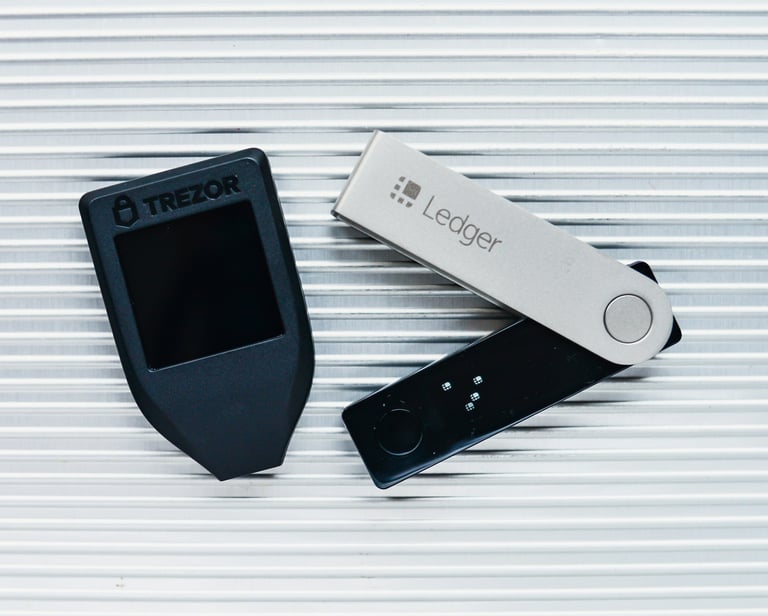
Navigating the World of Cryptocurrency Wallets: A Comprehensive Guide
This article discusses wallets in crypto, including types, costs, security considerations and which wallet is right for you.
INTRODUCTION TO CRYPTO
CryptoTokin
5 min read


Introduction: Cryptocurrency wallets serve as the gateway to the decentralized world of digital assets, enabling users to store, manage, and transact with their cryptocurrencies securely. With a plethora of options available, choosing the right wallet can be a daunting task for both beginners and experienced users. In this comprehensive guide, we will explore the various types of cryptocurrency wallets, their costs, security features, and factors to consider when selecting the right wallet for your needs. Whether you're seeking simplicity, security, or versatility, this article aims to provide valuable insights to help you make informed decisions in the cryptocurrency ecosystem.
Types of Cryptocurrency Wallets: Cryptocurrency wallets can be broadly classified into two main categories: hardware wallets and software wallets. Each category offers different levels of security, accessibility, and convenience to cater to the diverse needs of users.
Hardware Wallets: Hardware wallets are physical devices designed to securely store private keys offline, away from potential cyber threats such as hacking and malware. These devices typically resemble USB drives and come with built-in encryption and authentication mechanisms to protect users' funds. Hardware wallets are considered one of the most secure options for storing large amounts of cryptocurrency, making them ideal for long-term hodlers and investors who prioritize security over convenience.
Examples of popular hardware wallets include Ledger Nano S, Ledger Nano X, Trezor One, and Trezor Model T. While hardware wallets offer unparalleled security, they come with a higher upfront cost compared to software wallets.
Software Wallets: Software wallets, also known as hot wallets, are digital applications or programs that run on desktop computers, mobile devices, or web browsers, allowing users to manage their cryptocurrency holdings conveniently. Software wallets can be further categorized into desktop wallets, mobile wallets, and web wallets, each offering different features and levels of security.
Desktop Wallets: Desktop wallets are installed and run on desktop or laptop computers, providing users with full control over their private keys and funds. Examples include Exodus, Electrum, and Atomic Wallet.
Mobile Wallets: Mobile wallets are smartphone applications that allow users to access their cryptocurrency holdings on the go. Mobile wallets offer convenience and accessibility, making them suitable for everyday transactions and mobile users. Examples include Trust Wallet, Coinbase Wallet, and Blockchain Wallet.
Web Wallets: Web wallets are online wallets accessed through web browsers, enabling users to manage their cryptocurrency holdings from any internet-connected device. While web wallets offer convenience, they are more susceptible to security risks such as phishing attacks and hacking. Examples include MetaMask, Rainbow Wallet and Binance Wallet.
Costs Associated with Cryptocurrency Wallets: The cost of cryptocurrency wallets varies depending on the type of wallet and its features. Hardware wallets typically incur an upfront cost ranging from $50 to $200, depending on the model and brand. While this initial investment may seem high, hardware wallets offer robust security and peace of mind for users storing large amounts of cryptocurrency.
On the other hand, software wallets are generally free to download and use, although some wallet providers may charge fees for additional features or services. For example, some mobile wallets may charge transaction fees for sending cryptocurrency, while web wallets may impose fees for accessing advanced features or integrations with decentralized applications (DApps).
Security Features of Cryptocurrency Wallets: Security is paramount when it comes to cryptocurrency wallets, as they are responsible for safeguarding users' funds and private keys. To ensure the security of your cryptocurrency holdings, consider the following security features when choosing a wallet:
Private Key Control: Choose a wallet that gives you full control over your private keys, allowing you to manage and store them securely. Avoid wallets that retain control of your private keys, as they may pose security risks such as hacking or loss of funds.
Encryption: Look for wallets that implement strong encryption protocols to protect your private keys and sensitive information from unauthorized access. Encryption ensures that your wallet remains secure even if your device is compromised or stolen.
Multi-factor Authentication (MFA): Opt for wallets that support multi-factor authentication (MFA), such as biometric authentication or two-factor authentication (2FA). MFA adds an extra layer of security by requiring additional verification steps before accessing your wallet.
Backup and Recovery Options: Choose a wallet that provides backup and recovery options, allowing you to restore your funds in case of loss or damage to your device. Backup options may include mnemonic phrases, seed phrases, or recovery keys that can be used to recover your wallet on a new device.
Regular Updates and Security Audits: Select wallets that undergo regular security audits and software updates to address vulnerabilities and improve security features. Wallet providers should prioritize security and transparency to ensure the safety of users' funds.
Factors to Consider When Choosing a Cryptocurrency Wallet: When selecting a cryptocurrency wallet, consider the following factors to find the right fit for your needs:
Security: Prioritize security features such as private key control, encryption, and multi-factor authentication to protect your funds from theft or hacking.
Convenience: Choose a wallet that offers a user-friendly interface and seamless integration with your preferred devices and platforms. Consider factors such as accessibility, ease of use, and compatibility with your operating system or device.
Supported Assets: Ensure that the wallet supports the cryptocurrencies you intend to store or transact with. Some wallets may only support a limited range of assets, so verify compatibility before making your selection.
Reputation and Reviews: Research the reputation and reviews of wallet providers to gauge their reliability, trustworthiness, and track record in the crypto community. Look for feedback from other users, security audits, and endorsements from reputable sources.
Customer Support: Evaluate the quality and responsiveness of customer support offered by wallet providers. Choose wallets that provide timely assistance and support channels, such as email, live chat, or community forums, to address any issues or concerns you may encounter.
Which Wallet is Right for Me? The right cryptocurrency wallet for you depends on your individual preferences, needs, and priorities. Consider the following factors to determine which wallet aligns with your requirements:
Security: If security is your top priority and you're storing a significant amount of cryptocurrency, consider using a hardware wallet for maximum protection against cyber threats.
Convenience: If convenience and accessibility are paramount, opt for a software wallet that offers a user-friendly interface and seamless integration with your preferred devices and platforms.
Asset Support: Choose a wallet that supports the cryptocurrencies you intend to store or transact with, ensuring compatibility with your investment portfolio and trading preferences.
Budget: Consider your budget and willingness to invest in a hardware wallet upfront versus using a free or low-cost software wallet. Evaluate the long-term value and security benefits of hardware wallets compared to their upfront costs.
Use Case: Determine your intended use case for the wallet, whether it's long-term storage, daily transactions, or participation in decentralized finance (DeFi) activities. Select a wallet that aligns with your specific use case and requirements.
Conclusion: Cryptocurrency wallets play a crucial role in the adoption, security, and usability of digital assets in the decentralized world of crypto. Whether you're a newcomer exploring the basics or an experienced user seeking advanced features, choosing the right wallet is essential for safeguarding your funds and navigating the complexities of the cryptocurrency ecosystem. By understanding the different types of wallets, their costs, security features, and factors to consider, you can make informed decisions and select the wallet that best suits your needs, preferences, and priorities. Remember to conduct thorough research, exercise caution, and stay informed when participating in the cryptocurrency ecosystem to mitigate risks and maximize opportunities in this rapidly evolving space.


